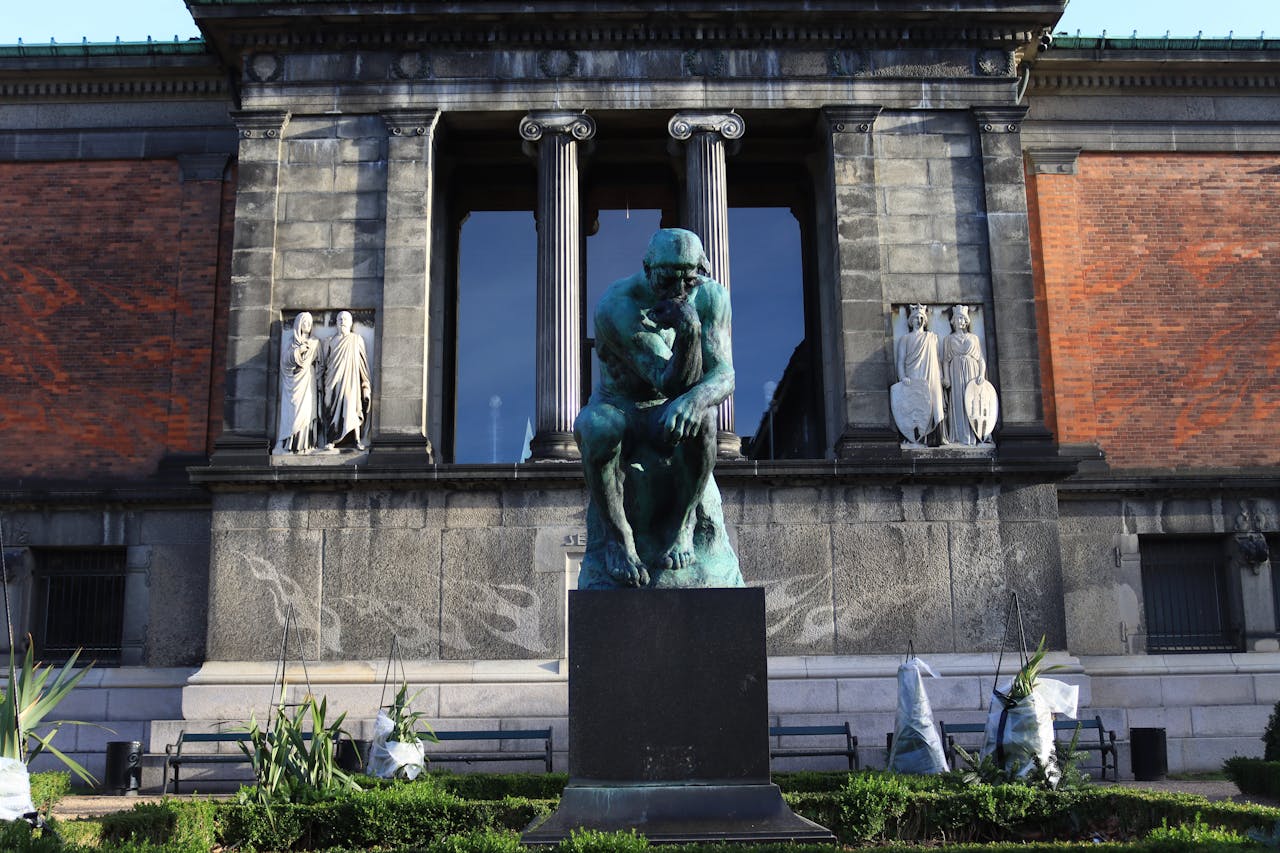Critical thinking has shaped human progress across various fields such as science, philosophy, and the arts. Throughout history, many individuals have significantly contributed to the development and refinement of critical thinking skills, leading to groundbreaking discoveries and innovations.

This article explores some of the most renowned critical thinkers whose ideas have left a lasting impact on the world. By examining their contributions, readers can gain a deeper appreciation of how critical thinking has driven human advancement and shaped the modern world.
1) Socrates

Socrates is considered one of the founding figures of Western philosophy. He lived in Athens during the 5th century BCE.
Socrates is best known for his method of questioning, now called the Socratic Method. This approach involves asking a series of questions to help a person or group discover their beliefs about some topic. This method is still widely used in teaching today.
He never wrote down his ideas, so what we know about him comes from the writings of his students, like Plato. Socrates’ ideas also influenced later philosophers such as Aristotle.
Socrates believed in the importance of ethics and self-knowledge. He famously said, “The unexamined life is not worth living.” His commitment to questioning authority and conventional wisdom led to his trial and death by drinking hemlock.
Socrates challenged the Athenian society with his belief that true knowledge comes from knowing that you know nothing. This idea was groundbreaking at the time. He is often remembered as a martyr for free thought and the pursuit of wisdom.
Learn more about Socrates from History.com’s Life & Philosophy and the World History Encyclopedia.
2) Plato

Plato is one of the most influential figures in Western philosophy. Born in Athens around 428/427 BCE, he was a student of Socrates and the teacher of Aristotle. His ideas have shaped many areas of thought, including ethics, politics, and metaphysics.
Plato founded the Academy, one of the earliest institutions of higher learning in the Western world. This school attracted many brilliant minds and laid the groundwork for future philosophical inquiry.
He wrote many dialogues, with “The Republic” being one of the most famous. In this work, Plato discusses justice, the ideal state, and the philosopher-king. His method of dialectical reasoning, known as the Socratic method, involves asking and answering questions to stimulate critical thinking and illuminate ideas.
Plato’s theory of Forms proposes that there are perfect, unchanging ideals or forms that exist beyond the physical world. According to him, these forms are the true reality, and our world is only an imperfect reflection of these ideals.
His influence extended to his student, Aristotle, who also became a major figure in philosophy. Plato’s legacy continues to inspire modern philosophical thought and remains a vital part of academic study today. Learn more about Plato’s Life, Philosophy and Legacy.
3) Aristotle
Aristotle, born in 384 BCE, was a significant Greek philosopher and scientist. He studied under Plato and later taught Alexander the Great. His work covered numerous fields, including logic, metaphysics, ethics, and biology.
He established the Lyceum, a school in Athens, where he spent much of his life teaching and writing. Aristotle’s vast writings influenced many areas of modern thought and study.
His contributions to philosophy include the development of formal logic and the idea of empirical research. He emphasized observation and experience as the basis for knowledge, contrasting with his teacher Plato’s focus on abstract forms.
Aristotle’s ethical theories emphasized the concept of virtue and the “Golden Mean,” advocating for balance in one’s actions and character. He believed that happiness is achieved by living a virtuous life.
In biology, Aristotle’s work set the groundwork for future research. He classified various organisms and studied their behaviors and anatomy. His observations and methods were used for centuries.
Aristotle’s influence extends to literature as well. His Poetics analyzed the elements of drama and tragedy, materials still studied in literary courses today.
His ideas about government and politics, documented in works like “Politics,” also shaped modern political theory. Aristotle examined different systems of government and their functions. His analyses remain relevant in today’s discussions on governance and citizenship.
4) René Descartes
René Descartes (1596-1650) was a French mathematician, scientist, and philosopher. He is often called the “father of modern philosophy”. Descartes is best known for the phrase “Cogito, ergo sum,” which means “I think, therefore I am.”
Descartes was one of the first to reject Scholastic Aristotelianism. He introduced mind-body dualism, distinguishing between the mind and the body. This concept led to what is known today as the mind-body problem.
In mathematics, Descartes developed the Cartesian coordinate system. This system allows geometric shapes to be expressed as algebraic equations. His work laid the groundwork for analytical geometry and has applications in various fields of science.
His contributions also extended to physics and optics. Descartes studied the nature of light and its properties. He published writings on the refraction and reflection of light, helping to advance the field of optics.
For more about Descartes’ impact on modern thought, visit René Descartes – World History Encyclopedia or Rene Descartes – Britannica.
René Descartes remains a seminal figure in both philosophy and science. His ideas continue to influence modern academic discourse. For a deeper look at his philosophical theories, see Descartes’ Epistemology – Stanford Encyclopedia of Philosophy.
5) John Locke
John Locke was an influential English philosopher born on August 29, 1632. He is widely regarded as the “father of liberalism” due to his significant contributions to political philosophy.
Locke’s most famous work is the “Two Treatises of Government”. In this book, he argued for the protection of individual rights and the idea that governments must be based on the consent of the governed. This concept greatly influenced democratic thought.
Locke also believed in the separation of powers within government. He asserted that no single entity should have complete control, promoting a system of checks and balances. His ideas were a foundation for modern democracy and impacted the Founding Fathers of the United States.
In addition to politics, Locke made notable contributions to philosophical empiricism. He argued that knowledge is derived from experience and sensory perception, opposing the notion of innate ideas. This perspective placed him among the first British empiricists, alongside thinkers like Francis Bacon.
Locke’s thoughts on the social contract were crucial, stating that citizens have the right to overthrow a rule if the government becomes tyrannical. This principle became an essential element of later political revolutions and democratic societies.
For more detailed information about John Locke’s life and theories, visit World History Encyclopedia or Britannica.
6) Immanuel Kant
Immanuel Kant, born in 1724, was a German philosopher who played a crucial role in the Enlightenment. His work reshaped modern Western philosophy.
Kant’s most notable work, The Critique of Pure Reason, challenged existing notions of empiricism and rationalism. He examined concepts like space, time, and causality and argued that our understanding of reality is shaped by these innate structures.
He also made significant contributions to ethics. His idea of the “categorical imperative” is a cornerstone of modern moral philosophy. This principle states that one should act only according to that maxim which can be made a universal law.
In aesthetics, Kant explored the nature of beauty and art. He distinguished between the beautiful and the sublime, influencing various fields beyond philosophy, including literature and art.
Kant also had a profound impact on metaphysics and political philosophy. He emphasized the importance of autonomy and freedom, setting the stage for later philosophical thought.
Kant’s ideas continue to shape contemporary discussions in many areas of philosophy and beyond. His legacy as an influential thinker endures through the continued study and application of his theories. For more details on his influence, refer to The 25 Most Influential Philosophers.
7) David Hume
David Hume was a Scottish philosopher who made significant contributions to the Enlightenment. He was born on May 7, 1711, and died on August 25, 1776. Hume is known for his works on empiricism and skepticism, challenging traditional ideas of knowledge and belief.
Hume’s major work, “A Treatise of Human Nature,” aimed to create a naturalistic science of man. He examined human psychology and how we understand the world around us. Hume argued that human knowledge arises from sensory experiences. This approach laid the groundwork for modern empirical research.
Hume was also a historian and an essayist. His “History of England” was widely read and respected. His written style and clear arguments made his work accessible to many readers.
One of Hume’s notable contributions is his gold-flow theory. This theory argued against mercantilism, showing that increasing a country’s money supply would not increase wealth. He believed that economic policies should be based on reason and observation rather than traditional beliefs.
Hume was a significant figure in the development of empiricism and metaphysical naturalism. His ideas have influenced many later thinkers and continue to be a critical part of philosophical studies today.
8) Thomas Aquinas
Thomas Aquinas was a medieval philosopher and theologian. He made significant contributions to Christian thought and culture. His works have influenced many fields, including metaphysics, ethics, and natural law.
Aquinas integrated philosophy and theology in his writings. He is known for his method of systematically considering and answering criticisms of his ideas. This approach reflects his commitment to critical thinking.
A Dominican priest, Aquinas took seriously the idea that grace perfects and builds on nature. He believed that philosophy investigates what we can naturally know about God and human beings. This perspective shaped his theological and philosophical work.
Aquinas’s writings, such as Summa Theologica, are essential readings in medieval Scholasticism. They reflect his thorough and methodical approach to tackling some of the most challenging questions of his time. His ideas continue to be studied and debated today.
For more on his life, works, and contributions, visit the World History Encyclopedia and the Stanford Encyclopedia of Philosophy. These sources provide comprehensive insights into Aquinas’s enduring legacy.
9) Friedrich Nietzsche
Friedrich Nietzsche was born on October 15, 1844, in Röcken, Prussia. Named after King Friedrich Wilhelm IV of Prussia, he later dropped “Wilhelm” from his name.
Nietzsche was a German philosopher and cultural critic. He is known for his uncompromising criticisms of traditional European morality and religion.
Nietzsche published intensively during the 1870s and 1880s. His works include “Thus Spoke Zarathustra” and “Beyond Good and Evil,” which challenge conventional philosophical ideas.
A classical scholar by training, Nietzsche became the youngest person to hold the Chair of Classical Philology at the University of Basel at age 24. He later turned his focus entirely to philosophy.
Nietzsche’s concept of the “Übermensch” and his declaration that “God is dead” are among his most famous ideas. These concepts had a significant impact on existentialist and postmodern thought.
His work in “On the Genealogy of Morality” explores the origins and meanings of moral concepts, questioning the basis of traditional Christian morality.
Despite his struggles with mental illness, Nietzsche’s influence on 20th-century thought is undeniable. He inspired countless thinkers, writers, and artists, making him one of history’s most significant critical thinkers. For more about Nietzsche, visit World History Edu.
10) Karl Marx
Karl Marx was born in 1818 in Trier, Prussia. He became one of the most influential thinkers of the 19th century. Marx is well known for his work “The Communist Manifesto,” which he co-authored with Friedrich Engels. This book laid the foundation for modern socialism and communism.
Marx’s ideas focused on the struggles between different classes in society. He believed that capitalism created a divide between the wealthy and the working class. He argued that the working class should rise and overthrow the ruling class to create a fair society.
Many of Marx’s theories were rooted in economic and societal revolution. His works influenced political movements around the world. Several communist regimes of the 20th century were inspired by his ideas. Marx spent much of his life in financial difficulty, relying on Engels for support.
Marx’s work extended beyond political theory. He also contributed to social and economic thought. His critique of capitalism and his ideas about class struggle continue to be studied and debated today. To learn more about Marx, visit the Stanford Encyclopedia of Philosophy.
11) Bertrand Russell
Bertrand Russell was a British philosopher, mathematician, and social critic known for his work in mathematical logic and analytic philosophy. His most influential ideas include his views on logicism, which links mathematics and logic.
Russell believed in the importance of critical thinking. He emphasized skepticism and questioned certainty. One of his well-known rules is, “Do not feel absolutely certain of anything” (TeachThought).
His ideas shaped modern philosophy and education. Russell’s work has influenced notable thinkers like Christopher Hitchens, Daniel Dennett, and Richard Dawkins. His philosophy of religion has had a lasting impact on atheism (The Marginalian).
Russell’s contributions go beyond his philosophical theories. As an advocate for social reform, he was vocal about issues like nuclear disarmament and free thought. His writings remain essential for anyone interested in philosophy and critical thinking.
12) Ludwig Wittgenstein
Ludwig Wittgenstein, an Austrian philosopher, was a major figure in 20th-century philosophy. He made significant contributions to the philosophy of language, logic, and mind. Wittgenstein’s work remains influential in academic circles today.
He authored two important works: the “Tractatus Logico-Philosophicus” and “Philosophical Investigations.” The Tractatus focused on the relationship between language and reality.
His later work, Philosophical Investigations, argued that meaning is based on use in language. This shift marked a significant change from his earlier views.
Wittgenstein’s impact extends beyond philosophy. His ideas influenced fields such as cognitive science and linguistics. He is often listed among the most influential philosophers since Immanuel Kant.
Throughout his career, Wittgenstein taught at Cambridge University. His complex and sometimes paradoxical thoughts continue to be studied and debated, ensuring his place among history’s most famous critical thinkers.
13) Albert Einstein
Albert Einstein was a German-born theoretical physicist who made profound contributions to science. He is best known for developing the theory of relativity, which revolutionized our understanding of space, time, and gravity. His famous equation, E=mc², showed that mass and energy are interchangeable.
Einstein’s work extended beyond relativity. He played a key role in the development of quantum mechanics, a fundamental theory in physics. His ideas challenged existing notions and opened up new avenues for scientific exploration.
One of Einstein’s strengths was his unique approach to thinking. He often relied on thought experiments rather than traditional rational thinking, as he mentioned, “I never came upon any of my discoveries through the process of rational thinking.” This helped him see problems from new perspectives and find innovative solutions.
Einstein’s influence is not limited to physics. He was also known for his critical thinking skills. His ability to strip away unnecessary details allowed him to focus on the core of a problem. This talent was highlighted by C.P. Snow, who spoke highly of Einstein’s intellectual gifts.
For more on Einstein’s approach to thinking, visit Evernote. To read about his life and achievements, check out Wikipedia.
14) Noam Chomsky
Noam Chomsky, born on December 7, 1928, in Philadelphia, Pennsylvania, is a renowned American intellectual. He is widely known for his groundbreaking work in linguistics and his significant contributions to political activism.
Often called the father of modern linguistics, Chomsky revolutionized the field by treating language as a uniquely human, biologically based cognitive capacity. His theories challenge the behaviorist view of language acquisition, proposing instead that humans have an innate ability for language.
Chomsky introduced the concept of generative grammar, a set of rules that predict grammatical structures in any language. This idea has had a lasting impact on linguistics and influenced related fields such as cognitive psychology and philosophy.
In addition to linguistics, Chomsky is a prominent social critic and political activist. He has written extensively on topics like media manipulation, U.S. foreign policy, and social issues. His views have earned him both acclaim and criticism.
Chomsky’s influence extends beyond academia. His works on media critique, particularly “Manufacturing Consent,” co-authored with Edward S. Herman, explore how mass media serves the interests of powerful societal groups.
For more about Chomsky’s life and achievements, visit his Wikipedia page or read his biography on Britannica.
15) Carl Sagan
Carl Sagan was a renowned American astronomer and science communicator.
He was born on November 9, 1934, and passed away on December 20, 1996.
Sagan is best known for his work in popularizing science.
He played a significant role in introducing the public to the wonders of the cosmos.
His television series, Cosmos, reached over 400 million people worldwide.
This series made complex scientific ideas accessible to all.
Apart from being a television personality, he was an avid researcher.
He conducted important research on the possibility of extraterrestrial life.
One of his groundbreaking experiments demonstrated the production of amino acids from basic chemicals through exposure to light.
Sagan was also an author.
His book, “The Demon-Haunted World: Science as a Candle in the Dark,” is a crucial guide to critical thinking.
In this book, he introduced the Baloney Detection Kit, which helps identify logical fallacies and deceptive arguments.
Sagan’s ability to communicate science made him a beloved figure.
He is remembered for his passion for the universe and critical thinking.
Carl Sagan’s influence continues to inspire new generations of scientists and thinkers.
The Role of Critical Thinking in History
Critical thinking has significantly shaped societies by fostering intellectual growth and scientific advancements. Key areas include societal development and the realms of science and philosophy.
Importance in Societal Development
Critical thinking has been essential for societal progress. From ancient Greece to modern times, thinkers have questioned norms and traditions, leading to social reforms. For example, Socrates’ method of probing questions aimed to uncover underlying assumptions and beliefs. This approach laid the groundwork for democratic processes and legal systems.
Furthermore, during the Enlightenment, critical thinking encouraged individuals to question authority and seek evidence-based conclusions. This led to significant social changes, such as the development of human rights and individual freedoms. Societies that value critical thinking tend to promote education, innovation, and ethical governance.
Impact on Science and Philosophy
Critical thinking has driven scientific and philosophical advancements. Early philosophers, like the Presocratics, used reason to understand natural phenomena, laying the foundation for scientific methods. John Dewey later expanded on this by linking critical thinking with reflective thinking, emphasizing the importance of a scientific mindset.
In philosophy, critical thinking has prompted debates on ethics, reality, and knowledge. It allows philosophers to dissect complex ideas and construct well-founded arguments. This rigorous analysis has led to significant theories and discoveries that continue to influence various fields, including mathematics, psychology, and political theory.
By encouraging a questioning attitude and systematic inquiry, critical thinking has propelled humanity towards a deeper understanding of the world. Contributions from notable figures, historical movements, and educational advancements highlight its lasting impact.
Courses and Cultivation of Critical Thinking
Courses designed to teach critical thinking are essential for developing the skills needed to analyze information and make informed decisions. Different educational methods and strategies are employed to foster these abilities from early education through higher learning.
Education and Critical Thinking
In education, critical thinking courses play a pivotal role. These courses often start with basic training in logic and reasoning. For example, schools may offer classes that teach students how to evaluate arguments, identify biases, and understand the relationship between evidence and conclusions.
Critical thinking courses are integrated into various subjects such as mathematics, science, and social studies. In math, students learn to solve complex problems by breaking them down into smaller, manageable parts. In science, they assess experimental data and consider alternative hypotheses. Social studies classes might include debates that encourage students to see multiple sides of historical events or societal issues.
Fostering Critical Thinking Skills
Cultivating critical thinking skills involves more than just coursework. It also requires a supportive learning environment where questioning and open discussion are encouraged. Teachers play a crucial role by posing challenging questions and inspiring students to think deeply about the topics.
Activities such as group discussions, problem-solving tasks, and hands-on projects help develop these skills. For instance, students might work in teams to tackle real-world problems or case studies, requiring them to use critical thinking collaboratively.
Additionally, encouraging curiosity and a love for learning can foster critical thinking. By promoting a mindset that values inquiry and skepticism, students become more equipped to apply critical thinking in all areas of their lives.
In summary, the cultivation of critical thinking involves structured courses and an educational culture that values exploration and understanding.





